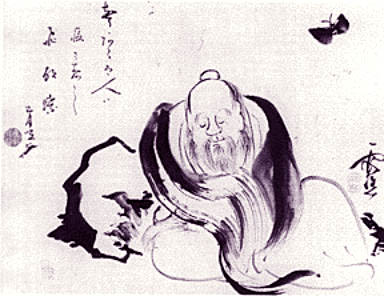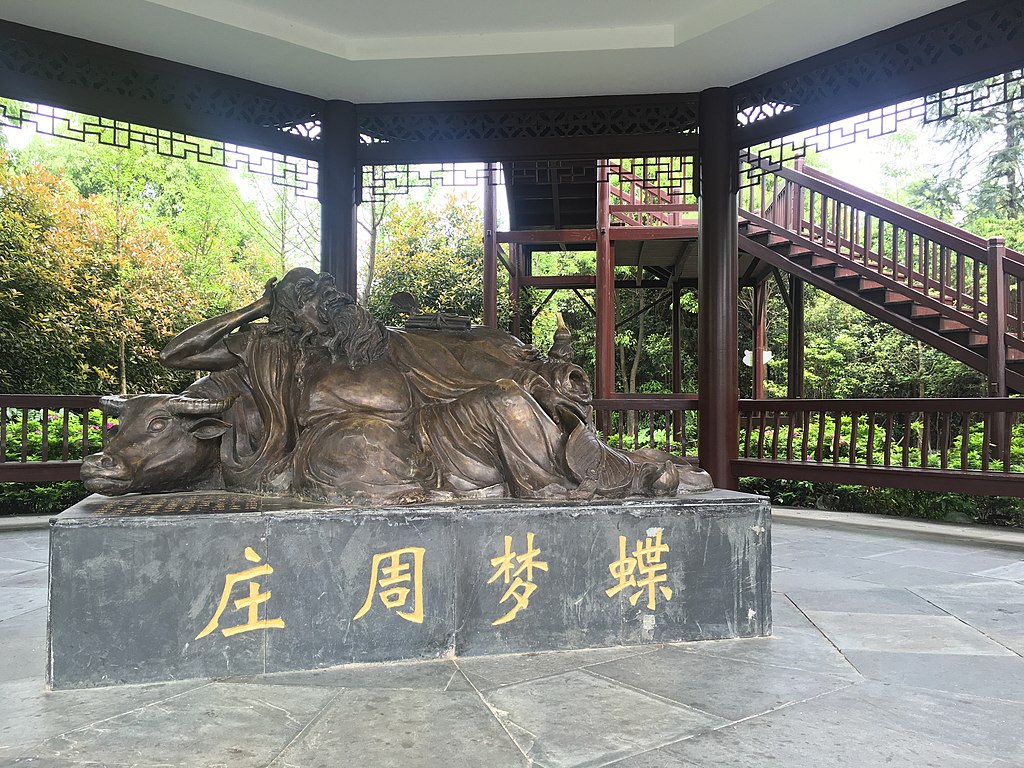
To “discriminate between alternatives” is to fail to see something’.”
(Chuang-tzu – Chapter 2)
A C Graham writes that Lun, in Ch’i wu lun, the Chinese title of chapter 2, ”means ‘sorting out’, which is the one kind of thinking always mentioned with approval in Chuang-tzu. Outside Taoism it suggests grading in superior and inferior categories, but Chuang-tzu detaches it from valuation, turns it into “the sorting which evens things out.” The theme of the chapter is the defence of a synthetising vision against Confucians, Mohists and Sophists, who analyse, distinguish alternatives and debate which is right or wrong. It contains the most philosophically acute passages in the Inner Chapters, obscure, fragmented, but pervaded by the sensation, rare in ancient literatures, of a man jotting the living thought at the moment of its inception.”
As an example of this rather unique style, I’d like to quote a few of the opening lines of the chapter:
Tzu-ch’i of Nan-kuo, waking up, says: “‘That hugest of clumps of soil [the earth] blows out breath, by name the wind,” and asks “You hear the pipes of men, don’t you, but not yet the pipes of earth, the pipes of earth but not yet the pipes of Heaven?”
The question here is a very serious one. Who, or what, is the source of the phenomena we encounter in the world? In Chuang-tzu’s words: “Who is it sits with nothing to do and gives them the push that sends them?”
Graham explains: “Chuang-tzu’s parable of the wind compares the conflicting utterances of philosophers to the different notes blown by the same breath in the long and short tubes of the pan pipes, and the noises made by the wind in hollows of different shapes. It is natural for differently constituted persons to think different; don’t try to decide between their opinions, listen to Heaven who breathes through them.”
Chuang-tzu had given the beginning of an answer on the next page: “The source from which it has these morning and evening, is it not that from which it was born?” Graham clarifies: it is the heart, the organ of thought for Chuang-tzu, and the question now is: “should the heart (as thought) be allowed to take charge of our lives?
Why is Chuang-tzu against ancient Chinese Disputation?
In his introduction to Chuang-tzu’s argument in chapter 2, Graham is keen to clarify in what way disputation differs from what in the West, we refer to as “discussion.” Though it postdates Chuang-tzu’s text, the Canons, a Mohist manual of disputation dating from about 300 BCE or a little later, provides us with helpful clues, and contains, in addition, “direct answers to some of Chuang-tzu’s criticisms of disputation.” Disputation is directly based on ancient China’s “theory of naming” which is “strictly nominalistic; a common name such as “horse” is given to a particular object and extended to all similar to it. When we ask what an object is, we are asking what name fits it. “Disputation” is the arguing out of alternatives, one right and one wrong, such as “Is it an ox or not?; questions in which both alternatives may be right or wrong (Is is an ox or a horse?, Is it a whelp or a dog?) are excluded from disputation. One party affirms and the other denies that the name fits, by expressions most conveniently translated by ‘That’s it’ or ‘That’s not’. Apart from deeming the object to be it, a horse for example, one may deem something to be so” of it (that it is white, that one rides it). By disputation one proves that a claim is or is not “allowable,” ultimately by appealing to the definitions of names … Among the logical terms of the Canons one which is especially prominent in Chuang-tzu is yin, “go by” (take as criterion); thus to judge whether a man fits the description ‘black man’ you have to decide which part of his body to ‘go by’ (his eyes? his skin?). It may be noticed that the basically demonstrative words ‘it’ and ‘so’ (the latter equivalent to “like it, ‘as it’) attract attention, as such English words as ‘true’ and ‘valid’ do not to the question whether users of a name are in fact picking out the same thing as it.”
As noted, the Mohist Canons were written after Chuang-tzu’s lifetime, so Graham asks “at what date Chinese thinkers came to appreciate that names have only a conventional relation to objects. Chuang-tzu is the earliest whom we know to have made the point explicitly; and throughout ‘The sorting which evens things out’, one feels the exhilarating shock of the discovery when it was still new, the apparent overthrow of all received ideas when it is first seen that in principle anything might be called anything. What is ‘it’ for me and what is ‘other’ than it depend on my choice of standpoint, and when I say ‘That’s it’, I merely have to name something else ‘horse’ and the objects commonly given the name will not be horses.”
What, however, is relatively simple when dealing with horses and other similar “things” or “beings” becomes a lot more complex when it comes to moral values. And moral values was the mainstay of the disputations between Confucians and Mohists.
Let’s see first how Chuang-tzu approaches the issue: “Saying is not blowing breath, saying says something; the only trouble is that what it says is never fixed.’ Or have we never said anything? If you think it different from the twitter of fledgeling, is there proof of the distinction? Or isn’t there any proof? By what is the Way hidden, that there should be a genuine or a false? By what is saying darkened, that sometimes ‘That’s it’ and sometimes ‘That’s not’ … And so we have the ‘That’s it, that’s not’ of the Confucians and Mohists, by which what is it for one of them, for the other is not, what is not for one of them for the other is. If you wish to affirm what they deny and deny what they affirm, the best means is Illumination.”
Clear enough, but “‘Other’ comes out from ‘it’, it, likewise goes by ‘other’ … ‘it’ and ‘other’ are born simultaneously … Simultaneously with being alive one dies.” And simultaneously with dying one is alive, simultaneously with being unallowable something becomes unallowable and simultaneously with being unallowable it becomes allowable. If going by circumstance that’s it then by going by circumstance, that’s not, if going by circumstance that’s not, then going by circumstance that’s it. This is why the sage does not take this course, but opens things up to the light of Heaven; his too is a ‘that’s it’ which goes by circumstance.”
Graham comments: “Here Chuang-tzu tries to discredit disputation by the objection that at any moment of change both alternatives will be admissible. He appeals to a paradox of Hui Shih. ‘The sun is simultaneously at noon and declining, a thing is simultaneously alive and dead, and generalises to the conclusion that any statement will remain inadmissible at the moment when it has just become admissible … Even with words such as ‘black’ and ‘white’ which are not comparative, one has to decide whether to ‘go by’ the black parts or the white when deeming someone a ‘black man’. Chuang-tzu sees it as the lesson of disputation that one is entitled to affirm or deny anything, He thinks of Confucians and Mohists who stick rigidly to their affirmations and denials as lighting up little areas of life leaving the rest in darkness; the Illumination of the sage is a vision which brings everything to light.”
This whole discussion may sound annoyingly futile, but we need to remember that in roughly the same period the West opted for the very opposite approach to reality. Plato (also 4th century BCE) equated “being” with the “Idea,” i.e., the “word,” standing for the abstract concept” representing “what it is,” thereby throwing the foundation upon which most of Western philosophy is based. Platonic “Ideas” were seen as the ultimately real, whereas the things we encountered in the world were merely (imperfect) copies of these abstract forms. Aristotle added that we become aware of these abstract forms through our experience of the world, but it remained that the abstract concepts were more real that the experience of their encounter in the world. In short, “to know a thing is to name it and to name it is to attach one or usually more universal predicates to it. Not only is the fixed within the flow alone knowable, but the universal in the individual as well. There is no place for the flow to be known as flow, nor the individual as individual.” (Robert Carter). Inasmuch as the “individual” can only be known through what it has in common with other entities sharing its name, it cannot be known as “individual.” The act of knowing was cut off from an experience of the concrete flow of phenomena we encounter in life, and became a dry manipulation of conceptual representations. No Chuang-tzu arose in ancient Greece to point out the absurdity of this move. And once it got going, as it is said, the whole western culture became a series of footnotes to Plato.
“Letting both alternatives proceed”
Chuang-tzu then introduces another dimension to the discussion, which I would call the “existential” dimension. Whereas Plato, and later Aristotle, focused on the “objective,” “ontological” nature of things, Chuang-tzu takes into consideration the existential, or social, function of words as lived in the actual interractions of daily life. This is where he tells the well-known story he calls “Three every morning.”
“A monkey keeper handing out nuts said, ‘Three every morning and four every evening’. The monkeys were all in a rage. ‘All right then’, he said, ‘four every morning and three every evening’. The monkeys were all delighted. Without anything being missed out either in name or in substance, their pleasure and anger were put to use; his too was the ‘That’s it’ that goes by circumstance. This is why the sage smooths things out with his ‘That’s it, that’s not,’ and stays at the point of rest on the potter’s wheel of Heaven. It is this that is called ‘Letting both alternatives proceed’.”
So, Graham comments, “Chuang-tzu allows the flexible ‘that’s it’ that goes by circumstance (yin shih), but rejects absolutely the rigid [that’s it’] which deems” found in disputation as carried out by the Confucians and the Mohists. “For Chuang-tzu one never loses the right to shift from one alternative to the other and allow either to ‘proceed’ the instance to the kind.”
Hui Shi theses and the mayhem wrought by the editor of the text.
Graham tells us that Chuang-tzu’s argument is shaped by the series of ten theses set out by Hui Shi, which he is challenging. These theses are listed, without explanations, in the last chapter of the Chuang-tzu “Below in the empire.” The content of these theses has been lost, so all we have is the counter-argument. In addition, the Syncretist who assembled the chapter cut or moved parts of the text to other parts of the book. Most of these theses, Graham tells us, “seem to be paradoxes designed to prove that one cannot make spatial and temporal divisions without contradiction (‘the South has no limit yet does have a limit’; “The sun at noon is simultaneously declining simultaneously with being alive a thing dies”). The last of the theses is different in nature: ‘Let your love spread to all the myriad things, heaven and earth are one unit’. This suggests that the point of the whole series is to show that since division leads to self-contradiction everything is one, other persons are the same as oneself, and therefore to be loved equally; it supports the principle of universal love preached by the Mohists. But it is clear that if he is taking this position Hui Shih has come dangerously close to discrediting his own tool, analytic reason. He wishes to discredit only spatial and temporal divisions, but it will take only one more step to observe that all reasoning depends on making distinctions, and to reach the conclusion that we should abandon reason for the immediate experience of an undifferentiated world, transforming ‘All are one’ from a moral into a mystical affirmation. It is in ‘The Sorting that evens things out’ that Chuang-tzu takes this step.”
Against reason that divides and for the illumination of the sage that unites
Coming back to Chuang-tzu’s text, we read:
“‘To divide’ … is to leave something undivided … The sage keeps it in his breast, common men argue over alternatives to show it to each other. Hence I say: ‘To ‘discriminate between alternatives’ is to fail to see something’.” And again, a little later in the text: “The sage does not work for any goal, does not lean towards benefit or shun harm, does not delight in seeking, does not fix a route by a Way, in saying nothing says something and in saying something says nothing, and roams beyond the dust and grime.”
The way back to wholeness is the way back to spontaneity. Graham comments: “Chuang-tzu derides all claims that reason can give us certainty. The only assurances we can have or should want is that of organic process and unanalysed knacks and skills, of whatever we confidently do without knowing how we do it. We have to ‘know how to know by depending on that which the wits do not know’, otherwise we are projected into ‘the ultimate uncertainty’.”
In Chuang-tzu’s words: “How do I know that to take pleasure in life is not a delusion? How do I know that we who hate death are not exiles since childhood who have forgotten the way home? … How do I know that the dead do not regret that ever they had an urge to life? Who banquets in a dream at dawn wails and weeps, who wails and weeps in a dream at dawn goes out to hunt. While we dream we do not know that we are dreaming, and in the middle of a dream interpret a dream within it: not until wake do we know that we were dreaming.”
Such is the uncertainty that we are fools if we hold onto rigid set views and sow discord among people. Chuang-tzu is therefore calling for a “smoothing out of the voices.” In Chuang-tzu’s words: “It makes no difference whether the voices in their transformations have each other to depend on or not. Smooth them out on the whetstone of Heaven, use them to go by and let the stream find its own channels; this is the way to live out your years. Forget the years, forget duty, be shaken into motion by the limitless, and so find things their lodging places in the limitless.“
This is how Chuang-tzu gets to the famous butterfly story: “Last night Chuang Chou dreamed he was a butterfly, spirits soaring he was a butterfly (is it that in showing what he was he suited his own fancy?), and did not know about Chou. When all of a sudden he awoke, he was Chou with all his wits about him. He does not know whether he is Chou who dreams he is a butterfly or a butterfly who dreams he is Chou. Between Chou and the butterfly there was necessarily a dividing; just this is what is meant by the transformation of things.”
Graham’s final remark: “Does Chuang-tzu’s rejection of disputation amount to a total dismissal of reason?”
“In the first place, spontaneous behaviour as he conceives it is not ‘thoughtless’ in the sense of ‘heedless’, on the contrary it follows close attention to the situation …when for example Cook Ting carving an ox arrives at an especially intricate knot of bone and sinew he pauses, concentrates until everything is clear to him, then slices through with a single deft stroke. Although Chuang-tzu rejects pien, “disputation,” the posing and arguing out of alternatives, he always speaks favourably of lun, “sorting, grading,” thought and discourse which orders things in their proper relations …It seems that Chuang-tzu does not forbid me to think about my situation. What he does forbid is thinking about what I or others ought to do about it, instead of simply answering with the spontaneous act or spontaneous approval or disapproval. The sage, we are told, ‘sorts’ everything within the cosmos but does not ‘assess’ the actions of the great men of history but does not engage in disputation about them; and as for what is outside the cosmos – that remainder left over from the total of oxen and non-oxen – he locates it but does not sort it.
And, most significant, one has to say that “in spite of the Taoist refusal to pose alternatives, the imperative ‘Mirror clearly’ does distinguish a wrong kind of spontaneity, the surrender to passions which distort awareness, from the right kind, responsiveness in the impersonal calm when vision is most lucid. This is precisely the point of divergence between Taoism and the superficially similar cult of spontaneity in our own tradition of Romanticism which values passion by its intensity however much it distorts reality.”
Sources:
A C Graham – Chuang-Tzu, The Inner Chapters
Robert E Carter – The Nothingness Beyond God – An Introduction to the Philosophy of Nishida Kitaro

